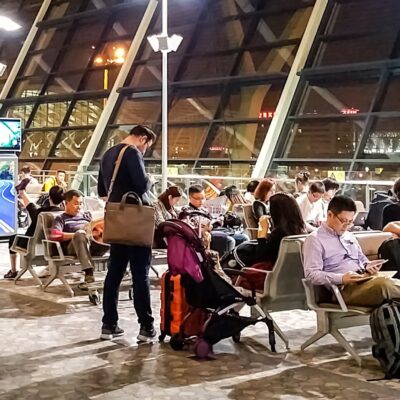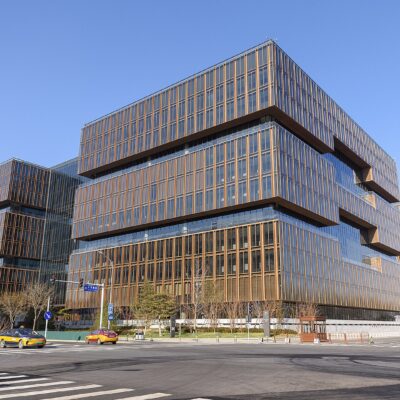China’s political, economic and cultural influence transcends national borders and is reshaping the world.
Its huge and growing influence is sometimes referred to as ‘Global China’ and encompasses outward flows of investment, loans, migration and media—most consequentially over the past 20 years.
Ching Kwan Lee is a professor in the department of Sociology at University of California, Los Angeles. She is a sociologist working at the intersection of global and comparative issues and one of the foremost experts on Global China. She spoke with Melbourne Asia Review’s Managing Editor, Cathy Harper.
What are the key elements of ‘Global China’?
‘Global China’ is shorthand for a very complex phenomenon with many different components. The term is a device to spotlight something, to call people’s attention to it, and make this phenomenon more discernible. There are many different elements that make up this global phenomenon: economic activities, the outward flow and expansion of investments, loans, infrastructure projects, but also the exodus of Chinese students to all kinds of higher education institutions in the West, medical diplomacy projects, medical teams, media and cultural exports such as TikTok, Confucious Institutes and Chinese scientists collaborating around the world. The phenomenon of Global China encapsulates all kinds of activities. They are not just driven by Chinese governments and government agencies, but also private citizens and private corporations. It is phenomenal, in that many people from different parts of the Chinese system are involved, are motivated or incentivized, to go global.
Outside China we mostly have awareness of the ‘top-down’ elements from government in terms of economy and security. Could you talk a bit more about those elements? And Deep Seek has recently created a big splash. Is that a ‘bottom-up’ influence?
It is often difficult to use Western categorizations and the differentiation between state and society in relation to China where public and private is not as clear cut as in the West. A lot of actors and institutions in China may be categorised in official statistics as State-owned or as private, but in actual operation and in terms of relationships and activities often the State has a role to play, even in the private sector. There has been a lot of debate in terms of Deep Seek. If you read the Financial Times and other media that have done investigative reporting on it, it looks private, but whether the State has subsidies, or have played a role in in pushing it through to this bombshell in the West, is difficult to tell. There has been a lot of speculation that they want to show it’s private, but it has all the fingerprints of the State and the timing of it being released and being announced to the world, coincides maybe too conveniently with ‘Made in China 2025’ where the Government needs to show its own people as well as the West, that it has somehow met its objectives of really boosting Chinese manufacturing and technological capacity. There are all kinds of things that would take a lot of investigative research to really tease out whether it’s top-down or bottom-up.
What is so distinctive about ‘Global China’, as opposed to ‘Global South Korea’ or ‘Global Japan’ or ‘Global U.S.’ is the role of the State. There are many things that distinguish ‘Global China’, such as the outward expansion of influence and outward flow of resources from other countries, such as the scale, the speed and the scope of Global China. But most importantly, the varying degree of State involvement in Global China is the distinguishing feature of all these flows. The diaspora and the outflow of people and students are private decisions, but even private decisions and private actors involved in outbound activities are usually undertaken with a view that the State has encouraged them, the State has somehow provided or facilitated their outward movement. Other governments don’t play such a high-profile, sometimes direct, role in encouraging the outward flow of capital, people, and cultural products.
Do you think that makes a difference in terms of the impact?
The impacts are very varied. The negative impact, I would say, is to make Chinese investment, Chinese migration, and Chinese presence in different arenas look like they’re all State- orchestrated. That has triggered lots of backlash, because if it is State-sponsored activity, then it would alert other foreign governments as to potential issues relating to national security and whether these people and corporations and activities have any negative impact on other countries. But State involvement in these activities gives Chinese actors a leg-up. For instance, if you have State subsidies, you have loans that are facilitated by the State Bank and if you want to get a loan for a project to build a road, then you get it quicker, it makes your proposal more appealing and it speeds up your business. It can cut both ways, and it has changed with time. Twenty years back, African countries welcomed these State-orchestrated loans for infrastructure. But some of the negative consequences are only emerging now and there is more concern about whether these State-backed loans are going to create a trap for some developing countries.
The impact of Global China in other countries is very nuanced, even within a single country such as Zambia where I spent a lot of time doing research. For instance, a lot of infrastructure is built now by Chinese construction companies and most of those who get Chinese bank loans are State-owned companies—they get easy approval from the Chinese State Bank for the loans. The loans are signed by Zambia, for instance, but are dispersed to the Chinese contractors. The loan goes from the Chinese bank through Zambia, who is getting the loan and being paid to a Chinese company. What are the positive and negative impacts of this kind of State involvement? The positive impact is that work can get done very quickly because the Chinese State, the Zambian government and the Chinese companies have a shared interest in expediting these projects. It’s positive for the construction company because it’s the Chinese Government that’s paying them, so they’re not exposed to any risk of nonpayment. It’s also to the benefit and interest of the Zambian politicians who sign off on those loans because their re-election often depends on whether they can deliver infrastructure projects to their electorate. Also, because Chinese loans come with less strings attached in terms of environmental assessment, human rights and gender equality, the kind of statistics that Western loans usually require, it’s much quicker. If you ask the elite, who want to ensure electoral victory so that they can keep themselves in positions of power, they would say “our country needs all this infrastructure, and we can get it quickly from China”.
The negative side is that the collusion of interests among these actors often creates overpriced projects because this system doesn’t involve any bidding and the Chinese company can set the price tag. So, the country, Zambia in this case, has to pay more. There’s no possibility for civil society to oppose it, because many of the terms in these loan agreements are not transparent. The way the Chinese State gets involved in these debt-financed infrastructure projects can create long-term negative consequences that are not easily visible and detectable in the short-term. In the short-term, lots of things are built quickly. But the local politicians are gone by the time the loans mature and have to be paid back. The benefits and the costs distribute quite unevenly and there can be long-term economic consequences. But if you talk to the African elite, they will say “my people have benefitted already. They are desperate for infrastructure”. If you’ve been to Africa, you know how big a deficit in infrastructure many countries have suffered and basic economic activities can’t be carried out if you don’t have passable roads. It depends on how you define benefits, whose benefit, what kind, and with what time frame.
Can you speak a little more about what this infrastructure means for non-elite Zambians? Does the infrastructure mean jobs for workers? Or perhaps the environmental destruction leads to a loss of land?
For the working people, such as those who work in the mines, Chinese investment has created similar negative and positive effects for the local communities just as other types of investment from the West and previous former colonial powers. All the negative externalities to people and to community and to environment that are brought about by other sources of investment or capital apply to Chinese sources of investment or capital.
But in my research, I also found that because a lot of Chinese investment is State investment, it’s very different to footloose transnational private capital which is listed on international stock exchanges. Chinese State capital has a different view of profit. Private capital investors’ idea of profit is monetary and if they don’t make profit in a financial sense they either close their business or move somewhere else. But my research in Zambia finds that the Chinese state has a more complicated and multidimensional notion of profit. Earning money from copper, for example, is one kind of profit, but they’re also looking at politically profiting from the situation. That is, they want to build long-term relationships with Zambia as a government, so Zambia will do the bidding of Beijing in international arena. Another difference for Chinese State capital is that they want the copper for its use value, whereas other companies want copper’s exchange value. For China, to own these resources is in the State interest. China has a wider range of categories of profit and it makes Chinese State capital more stable and more patient, so to speak, which creates a more stable kind of employment and structure for the local communities. This is well documented in my book. I talked to many miners and communities, local residents in the mining areas, and they’ve noticed that this is a big difference. In 2008, when the copper belt in Zambia had a really horrifying crisis, employment was significantly cut and some investors closed their mines and sold. But the Chinese didn’t cut employment or salaries, they actually bought other investor’s mines. As a result, they greatly increased their political capital because they were such a stabilizing force when the whole world was in crisis.
To sum up my point here, my argument here is that Chinese State capital does exploit labour and pollute the environment. But it also has very unique characteristics that have some positive consequences for the local community, because it is State-owned and State interests are different from private investors’ interests.
Why is China ‘going global’?
I think there are two reasons, if I were to simplify it from the perspective of the government. For many Chinese companies in many different sectors the market has become saturated. The profit margin has fallen in many sectors such as construction, retail and all kinds of machinery. When your domestic economy has got to a certain state of development and the market has been saturated within your country you want to expand out. The Chinese economy has reached a point where China is producing more of everything than it can domestically consume. That means its bottom line is shrinking, especially after 2008 during the Global Financial Crisis when suddenly the traditional export market for China shrunk a lot and the US and Europe suddenly could not consume as before. The Chinese Government needed to find other growth points for the economy. For the Chinese Government, or Party-State, it is incredibly important for the economy to continue to grow because its political legitimacy is grounded in continued growth to show people that while they don’t have political choices and freedom, the government will deliver economic growth so that the people can grow rich and have a good life. The economy is the top priority for every level of government because it’s not just about the economic growth, but the Party-State’s political legitimacy in the eyes of its people. To keep people happy in a material sense, you need bigger markets and the Chinese Government sees a lot of reason to go into Latin America, Africa and Southeast Asia.
The second reason is similar to the political legitimacy problem. The Party-State sees it as a very useful method to boost nationalism. It has told the people that China’s rise, which summons pride among the people, is creating a lot of international backlash so they have to rally around the centre, the leader, and the party which is the guardian of national interest. It really allows the Party-State to consolidate power and strengthen its claim to power. However, it’s a very uneven picture as to what extent has the Party-State has achieved its goals. At the moment, China is experiencing severe economic distress and for many reasons it is in the middle of a kind of recession, perhaps something like what Japan experienced for a prolonged period. China’s economic distress has domestic origins. The property bubble burst, but also there is the overcapacity problem and that may be contributing to the recession, that is, you produce too much and don’t have enough consumption power.
It would be really interesting to hear your analysis of the second administration of US President Donald Trump and the impact its actions might have on Global China.
If the U.S. is indeed withdrawing from many different kinds of international arenas, from climate to foreign aid, and withdrawing from international engagements and transnational institutions and focusing on its so-called national interests, then Global China will have a real moment of opportunity. One of the most active arenas for Global China has been international or transnational institutions of governance, such as the International Monetary Fund, the World Trade Organisation, the development banks, the Human Rights Council, and the United Nations. China has been very active in putting its own officials in these institutions because it wants to set standards in relation to human rights, making loans, dealing with an epidemic, technology, civil engineering—all kinds of standards. China realizes that the U.S. has a dominant position in intangible things such as setting global norms and international standards, human rights, the standards of 5G, or making loans, climate mitigation and how you measure pollution.
If the U.S is withdrawing from all these arenas, China will have an opportunity to partner with countries it has built up relationships with as a kind of anti-colonial, anti-imperialist bloc in the United Nations. I think Trump is delivering something that is unprecedented to China—it has been hoping for an opening within the old system and now the hegemon is almost withdrawing itself from its positions of power and will leave a vacuum of power, influence and resources. China is the only viable alternative in many ways. But it doesn’t mean that China will be a better alternative given its political values and the kind of system they want to see in place. I think we’re bracing for a very volatile period.
Can Global China be resisted?
I want to highlight, based on other people’s research and my own research, that China is not a coherent actor—that within the Chinese system there are a lot of actors that have conflicting interests. So, if a rail project is abandoned or an investment project collapses, it’s often because Chinese actors are acting at cross purposes. Central government interests may not always be in-sync with provincial government interests or corporate interests. The other thing is that the political leaders of developing countries are very skilled and experienced in dealing with dominant outside powers and they could channel Chinese resources to serve their own purposes.
Other nations can resist Chinese projects and Chinese actors within the Chinese system can also resist by making projects fail. I want people to stay away from this idea that China is one coherent actor and that once it’s decided from the top then all Chinese actors will align. That’s far from the reality.
Image: People standing near the Temple of Heaven in Beijing. Credit: Charles Gao/Unsplash.
Further reading:




